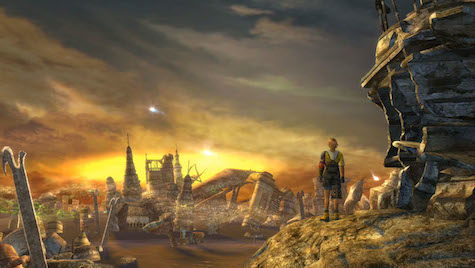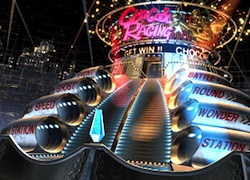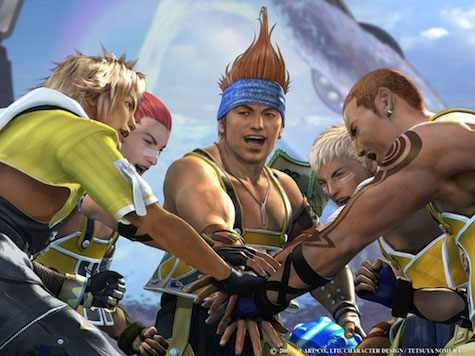Last week, I took a look at framing devices and nested narratives in books, movies, and TV shows. Today, I’m going to switch gears and take a peek at how framing relates to gaming—and specifically to the upcoming HD remaster of the Square-Enix classic, Final Fantasy X.
FFX was a huge success when it hit the Playstation 2 in 2001. As the first Final Fantasy for Sony’s second-generation system, the game represented a major technological leap forward: it featured voice acting, pre-rendered backdrops, real-time cut scenes, and stunning cinematics. It also had a great story, and the most fully-developed world Square-Enix had ever created. It was a watershed moment in videogame history.
 Yet for all that, one of the things I remember most about Final Fantasy X was a little mini-game called Blitzball. For the uninitiated, Blitzball is a fast-paced team sport reminiscent of underwater polo, played inside a massive sphere of water. “Blitzers” try to throw a ball past a series of defenders through a triangular hoop, racking up points to win matches and move up in the standings. In Final Fantasy X, you can spend as many hours as you like visiting the Blitzball stadium and mastering the sport—for in-game money, for special items, or simply for a change of pace.
Yet for all that, one of the things I remember most about Final Fantasy X was a little mini-game called Blitzball. For the uninitiated, Blitzball is a fast-paced team sport reminiscent of underwater polo, played inside a massive sphere of water. “Blitzers” try to throw a ball past a series of defenders through a triangular hoop, racking up points to win matches and move up in the standings. In Final Fantasy X, you can spend as many hours as you like visiting the Blitzball stadium and mastering the sport—for in-game money, for special items, or simply for a change of pace.
What’s interesting about Blitzball, is that I would never play this game as a standalone title. It’s too simple. One Blitzball match does not vary significantly from the next. Yet I spent more hours playing Blitzball than I did playing FIFA Soccer that year, which is really saying something. The game had me hooked—and the reason has to do with framing.

When you load up a game like Final Fantasy X, you relocate a piece of yourself into a story world, forgetting your own life so that you can identify with the game’s characters. Since a game like this can take 40-60 hours to play, you inevitably get emotionally invested—and that can be taxing when the story deals with genocide and religious persecution and the end of the world. So when you get an opportunity to take a break and play a little Blitzball, it doesn’t feel like some lesser gaming experience. It’s actually an important part of the experience. A much-needed exhale. Everyone needs a little sporting fun between efforts to save the planet.
 Long-time fans of Final Fantasy will remember the Gold Saucer from Final Fantasy 7. Many long hours into the game, you arrive at this massive amusement park, complete with a roller coaster, a playable arcade, and a Chocobo racetrack. The place is so big that it could be the hub for some Nintendo Wii party game—and after weeks of fighting Shinra, it’s an awesome diversion. On its own, you wouldn’t really care about the Gold Saucer. It’s kitchy and the arcade games are retro at best. But as part of a wider story world, it’s a fantastic place to visit. An arcade within a game!
Long-time fans of Final Fantasy will remember the Gold Saucer from Final Fantasy 7. Many long hours into the game, you arrive at this massive amusement park, complete with a roller coaster, a playable arcade, and a Chocobo racetrack. The place is so big that it could be the hub for some Nintendo Wii party game—and after weeks of fighting Shinra, it’s an awesome diversion. On its own, you wouldn’t really care about the Gold Saucer. It’s kitchy and the arcade games are retro at best. But as part of a wider story world, it’s a fantastic place to visit. An arcade within a game!
Many games take advantage of the allure of mini-games. Sprawling RPGs use them as a way for players to take a break from their long primary quests. Platformers use mini-games to change up the play style, and have done ever since the days of Super Mario Brothers 3 on the NES. There are mini-games in the Zelda world, in the LEGO series, and even in the aforementioned FIFA games. In every case, these games are intended to change up the gamer’s experience for a little bit and provide some fun within the fun.
 Here’s the thing. Would you ever run around trying to catch ten chickens in thirty seconds if there wasn’t a heart container at stake? Does the idea of a LEGO Aragorn riding a goat through an obstacle hold any appeal if you’re not trying to earn a mythrill brick that will help you save Middle-earth? It’s not that mini-games aren’t fun—they are. But games, like stories, take on meaning based on how they’re framed. Even the silliest games become fun when they’re set in a world that makes them matter.
Here’s the thing. Would you ever run around trying to catch ten chickens in thirty seconds if there wasn’t a heart container at stake? Does the idea of a LEGO Aragorn riding a goat through an obstacle hold any appeal if you’re not trying to earn a mythrill brick that will help you save Middle-earth? It’s not that mini-games aren’t fun—they are. But games, like stories, take on meaning based on how they’re framed. Even the silliest games become fun when they’re set in a world that makes them matter.
Of course, some mini-games take on a life of their own. In the Harry Potter universe, Quidditch is as important as soccer is in real-life England. A sport where the rules themselves are magical is pretty cool, which might explain why it led to both a standalone Quidditch videogame and several real-world high school Quidditch teams—not to mention showing up as a mini-game within other Harry Potter titles.
But perhaps the most interesting development when it comes to games within games is the advent of trophies and achievements. The introduction of these meta-systems for tracking players’ accomplishments within games adds an interesting layer of gamification to the gaming experience: now not only do you have the fun of playing a game, you also get the fun of playing a kind of wrapper game that sticks around even after you’re done playing. In a sense, that’s yet another frame around the gaming experience—a meta-game that surrounds the game proper. (Incidentally, the addition of trophies to Final Fantasy X is one of the most hotly anticipated features of the re-release. Players have grown used to collecting in-game achievenments, and want credit for all the hard work they did the first time around!)

Games within games within games… stories within stories within stories. These could be the subjects of a book rather than a couple blog posts, but the take-home is this: context is everything. So am I looking forward to Final Fantasy X HD next March? Sure. But not just for the epic adventure. I also want the trophy that names me Blitzball League Champion. It’s not just that I love the sport. It’s that saving the planet is grueling hard work, and sometimes I just need to let off a little steam.
Final Fantasy X / X-2 HD Remaster is slated for release on PS3 and PS Vita in March 2014.
Brad Kane writes for and about the entertainment industry, focusing on storytelling in movies, TV, games, and more. If you enjoyed this article, you can follow him on Twitter, like Story Worlds on Facebook, or check out his website which archives the Story Worlds series.










